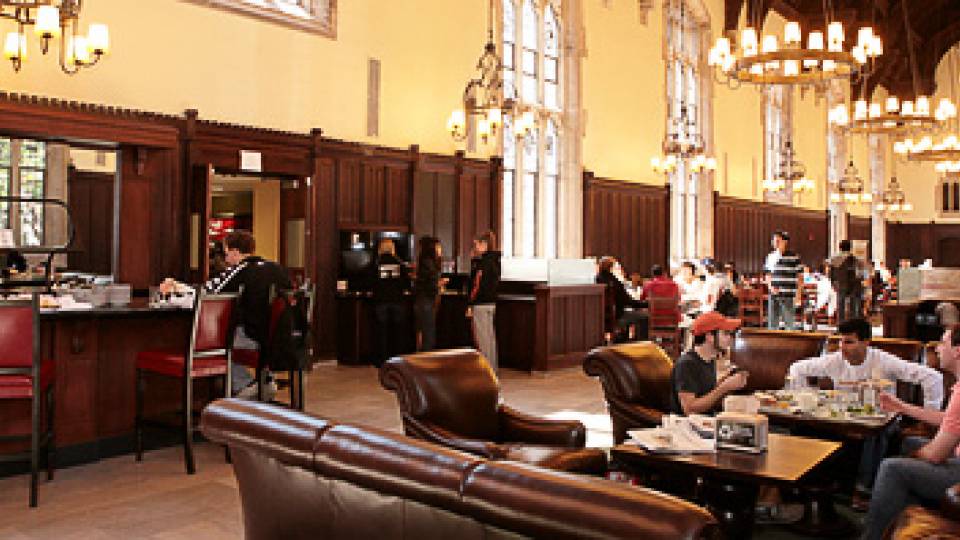The University's first room selection process ushering in a system that affords students an expanded range of choices closed Wednesday, April 25, with Princeton officials marking it a success.
Student housing decisions and substantial interest in new meal options that will be implemented this fall were affirmative signs that students were availing themselves of new choices that have been under development since the Four-Year Residential College Program Planning Committee, which comprised faculty, staff and students, issued its report in August 2002.
Among the offerings, the two new four-year residential colleges, Mathey and Whitman, reached their target capacity for juniors and seniors choosing to live in the colleges. Also, a record 216 applications were received for the 93 residential college adviser (RCA) positions in all six of the residential colleges, in addition to the 131 applications received for the 55 college spots set aside for graduate students.
The majority of students who signed up for college meal plans chose a variety of options that granted them more meals than the minimum 95-block plan that is the basic standard in residential colleges, as 25 percent chose larger dining plans and 35 percent chose shared-meal plans with the eating clubs. Most undergraduates took advantage of exploring their housing choices by applying to multiple "room draws" via a new online selection system. More than 97 percent of next year's sophomores, juniors and senior submitted applications online.
"Room draw was a success by all the measures we might use," Director of Housing Andrew Kane said. "That includes the level of interest in the four-year college program, the increase in options that were available for every student going through the process, and the ease with which they could explore all their options and choices in an online format without having to assemble in one place, or having to disrupt their academic schedules and their personal schedules to do so."
The University has spent more than a year sustaining a multifaceted campaign to engage students in conversations about the residential life changes that will take place on campus next academic year. Among them are the improvements to food quality and dining facilities, closer collaboration with the eating clubs, enhancements to academic advising, and the launch of the new four-year residential college system that allows a select number of juniors, seniors and graduate students to participate fully as members of a college system that currently serves freshmen and sophomores.
Mathey and the newly constructed Whitman will open in September as four-year colleges, while Butler , Forbes, Rocky and Wilson will remain two-year residential colleges. Butler College will become a four-year college after many of the existing Butler dormitories have been razed and replaced with new construction. The colleges eventually will have redesigned dining facilities featuring a "marketplace" concept in the serveries that will showcase a more retail, cook-to-order format.
"Expanding student choice has been our primary goal, so we are gratified that we were able to provide more opportunities for students to choose what they want out of their residential experience," said Executive Vice President Mark Burstein, one of the principal planners in the residential life improvements. "Changing the dynamic of residential life on a campus always carries some unknowns, but students have taken full advantage of the new options, demonstrated by the number of students represented among all the different options during room draw."
Within the housing options, 210 upperclassmen chose to live in the apartment-style Spelman dormitories, where many students are "independent," and 118 additional students living in upperclass housing chose "independent" rooms, meaning they have no dining contract with the University or an eating club.
The University offered plans of 190 and 235 meals -- in addition to the basic 95-meal plan -- and a new plan of unlimited meals. Of the juniors and seniors who selected housing in a four-year college, 91 selected another new option, the shared-meal plan, which allows them full membership in a residential college and an eating club.
"The distribution of students taking advantage of all the available options really shows us that students have a variety of needs when it comes to dining," said Stuart Orefice, director of dining services. "It's exciting to see students embrace all the new options because our entire program represents variety in so many ways."
Orefice added that, because all upperclassmen automatically receive two extra meals per week at any dining hall in a residential college, the facilities offered by the colleges will be open to students regardless of where they live.
With 100 and 200 spots set aside for the RCA's and other upperclass students in Mathey and Whitman colleges respectively, both filled to capacity during room draw for upperclassmen. One-hundred eighteen juniors and 86 seniors drew rooms in Whitman, while 76 juniors and 18 seniors drew rooms in Mathey. The remaining six Mathey spots will offer the opportunity for students who were unable to participate in room draw still to be able to participate in the four-year residential college experience, officials said.
"The basic premise of the new college system is that all upperclass students will retain an affiliation with a residential college, no matter where they may live on campus," said Dean of the College Nancy Malkiel, one of the principal planners and architects in the residential life improvements. "Juniors and seniors who live elsewhere on campus will come back to their colleges for their non-departmental academic advising, for some of their meals, and for a range of activities in which they will be welcome to participate. Having a solid residential base of juniors and seniors in the two new four-year colleges provides the anchor for the four-year community we are trying to build."
Princeton officials said they will use student feedback from this year's room draw to consider additional improvements for next year.


